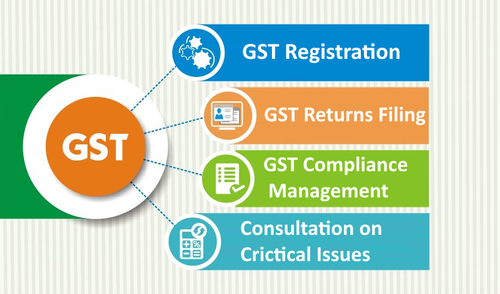Comprehending the Perks of the most effective GST Registration Services in Singapore
Comprehending the Perks of the most effective GST Registration Services in Singapore
Blog Article
From Beginning To End: The Ultimate Roadmap to GST Registration for Services Looking For Financial Stability
Browsing the intricacies of Goods and Services Tax (GST) enrollment is an important step for services striving for economic stability. From recognizing the fundamental concepts of GST to adhering to post-registration standards, the procedure can seem intimidating at first look. Damaging down the roadmap into convenient actions can simplify the enrollment trip for companies looking to enhance their financial standing. Let's explore the important components that make up this utmost roadmap and uncover how each stage adds to laying a strong foundation for financial success.
Comprehending GST Essentials
Exploring the basic principles of Product and Solutions Tax (GST) is necessary for getting an extensive understanding of its ramifications on companies and the economy. GST is a value-added tax obligation imposed on most items and solutions for domestic usage. It has actually replaced numerous indirect taxes that existed in the pre-GST era, streamlining the tax obligation framework and enhancing convenience of doing service in India. Under the GST system, both products and services are tired at a certain rate, which is determined based upon their classification. Businesses are called for to register for GST if their yearly turnover surpasses the threshold limit established by the government. Input Tax Obligation Credit Rating (ITC) is a significant function of GST, allowing services to assert debt for taxes paid on inputs, lowering the overall tax concern. Recognizing the basics of GST is vital for businesses to abide by tax laws, manage their financial resources successfully, and add to the nation's economic growth by taking part in a transparent tax system.
Eligibility Criteria for Enrollment
To sign up for GST, businesses must satisfy certain eligibility standards established by the government. The main eligibility requirement is that any company included in the supply of goods or solutions with a yearly accumulation turn over above the threshold limit established by the authorities should register for GST. As of the current laws, the threshold restriction for GST enrollment is a yearly aggregate turn over of 40 lakhs for services operating within a state, other than for unique classification states where the limitation is 20 lakhs. Additionally, particular services are required to register for GST irrespective of their turn over, such as interstate distributors, laid-back taxable individuals, and organizations reliant pay tax under the reverse cost device. It is critical for services to completely assess their turnover and transaction kinds to determine their GST registration responsibilities precisely. Failing to register for GST when eligible can lead to fines and lawful repercussions, making it important for businesses to stick to the specified eligibility requirements.
Records Needed for Registration
Having fulfilled the qualification standards for GST registration, organizations must now ensure they have the requisite papers in area to wage the registration process successfully. The records required for GST registration generally consist of evidence of organization constitution, such as collaboration act, registration certification, or incorporation certificate for different kinds of companies. Furthermore, services require to supply records developing the major business, such as a rental agreement or electricity bill. Frying pan card of the business, in addition to the identity and address evidence of promoters/partners/directors, are necessary for verification functions. Savings account declarations, together with terminated cheques or a duplicate of the bank passbook, are needed to verify the financial details provided throughout enrollment. Companies should have digital trademarks ready for the authorized notary. Making sure all go now these files are arranged and easily offered will certainly accelerate the GST registration procedure, making it possible for services to comply with tax obligation laws effortlessly.
Step-by-Step Registration Process
Commencing the GST enrollment process includes a collection of structured steps to make sure a compliant and smooth registration for organizations. The first step is to check out the GST portal and submit the enrollment kind with precise details of business entity. Following this, the candidate obtains a Momentary Reference Number (TRN) which is utilized to return to the application procedure if it's not finished in one go.
Next, all called for documents Get More Information as per the checklist given by the GST portal need to be submitted. These papers generally include evidence of organization identity, address and registration proofs of promoters, economic declarations, and organization entity's frying pan card.

Post-Registration Conformity Guidelines

Conclusion
In conclusion, businesses seeking financial security must recognize the basics of GST, meet Check Out Your URL eligibility standards, gather necessary documents, adhere to the detailed registration procedure, and comply with post-registration standards - Best GST registration services in Singapore. By sticking to these steps, companies can make certain compliance with tax obligation laws and preserve financial security in the long run
Additionally, particular companies are called for to sign up for GST irrespective of their turnover, such as interstate vendors, laid-back taxed persons, and businesses accountable to pay tax under the reverse charge system.Having satisfied the eligibility standards for GST enrollment, organizations need to currently ensure they have the requisite papers in place to proceed with the enrollment process successfully. The files required for GST enrollment usually consist of proof of business constitution, such as collaboration deed, registration certification, or unification certificate for various kinds of services. Additionally, services require to offer papers establishing the primary place of service, such as a rental agreement or electrical energy bill.Beginning the GST registration process includes a collection of organized steps to make certain a compliant and seamless enrollment for organizations.
Report this page